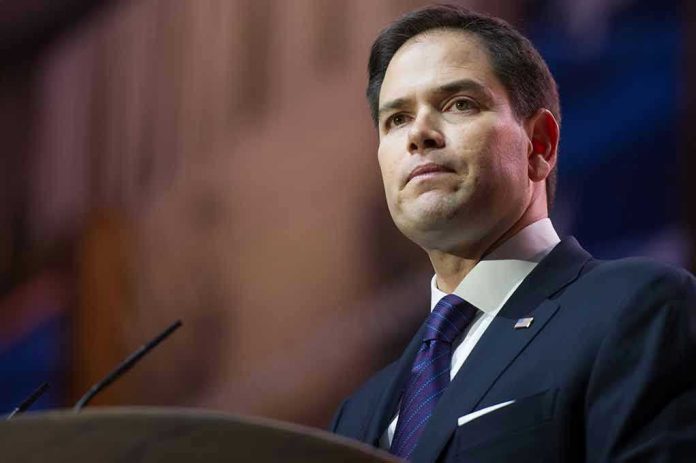
Rubio’s near $100 million axe to State Department travel isn’t just a budget line—it’s a seismic jolt to America’s diplomatic playbook, and the aftershocks are only beginning.
Story Snapshot
- Rubio, as Secretary of State, cut conference and travel spending by almost $100 million compared to the Biden era.
- Conference attendance and site visits were slashed as part of a broader “America First” policy shift.
- Over 1,300 domestic staff layoffs initiated alongside a major OMB recommendation to halve the State Department budget.
- U.S. global presence, international partnerships, and diplomatic influence face new uncertainty.
Rubio’s Fiscal Scalpel: A $100 Million Statement
From January to September 2025, the State Department’s travel budget shrank from $306 million under Biden to $212 million under Rubio, marking a year-over-year slide that would make even the most penny-pinching auditor crack a smile. The directive was clear: conference junkets and site visits were the first casualties. This wasn’t a cosmetic trim—it was a deep cut aimed at the roots of what Rubio’s camp derided as “bureaucratic bloat.” The message to Washington’s globe-trotting diplomats: fewer selfies at summits, more substance at the negotiating table.
Rubio ditches costly conference travel, slashes nearly $100M in Biden-era bloat https://t.co/xUgnPwzmL8 #FoxNews
— Jerry 🏆🏆🏈 (@jg4dawgs) October 24, 2025
OMB’s April memo, delivered with the cold precision of a surgeon’s report, recommended halving the department’s and USAID’s budgets for the coming fiscal year. That set the stage for a July layoff wave, sweeping out over 1,300 domestic staff. The reductions sent a chill through Foggy Bottom, with many career diplomats left questioning not just their job security, but the future of American engagement abroad.
What’s Missing When Diplomats Stay Home?
The cuts have been cast as a course correction—a return to what Rubio’s team brands “real diplomacy.” Principal Deputy Spokesperson Tommy Piggot quipped, “We believe in real diplomacy, not meetings for the sake of meetings.” The implication was that America’s diplomats had grown too comfortable with the perks of professional development, networking, and the endless churn of international conferences.
But on the flip side, international partners and some lawmakers have sounded alarms about the risks. Fewer U.S. faces at global gatherings mean fewer chances to build alliances, gather intelligence, and promote American values. The Senate’s correspondence to Secretary Rubio flagged concerns about longer visa wait times and a potential downturn in international tourism, both of which ripple out to impact the U.S. economy and local communities reliant on foreign visitors.
Rubio ditches costly conference travel, slashes nearly $100M in Biden-era bloat https://t.co/gdjAmY8cpX #FoxNews
— William Bevington (@rayfanty) October 25, 2025
The Political Calculus: America First, But At What Cost?
Rubio’s moves are a natural extension of the “America First” philosophy, but the scale and speed of the changes have even seasoned observers raising eyebrows. Previous Republican administrations have targeted bureaucratic waste, yet this round of cuts dwarfs past efforts. Supporters cheer the savings as overdue—finally, a dose of fiscal discipline in a city notorious for its excess. Critics, however, warn that the quick retreat from international engagement risks ceding influence to rivals and undermining decades of soft power.
Inside the State Department, morale has taken a hit. Staff now navigate a leaner, less predictable environment. International partners, meanwhile, are left recalibrating their expectations of U.S. involvement, especially as the 250th anniversary of American independence approaches—a milestone that was expected to showcase diplomatic strength, not retrenchment.
Ripple Effects: Beyond the Beltway
The impact extends far beyond government offices. Conference centers, hotels, and airlines accustomed to lucrative federal bookings are already feeling the pinch. Universities and non-profits, which rely on international collaboration and exchange programs, see a cloud on the horizon. For some communities, fewer international visitors translate into tangible losses—economic, cultural, and educational.
Long-term, the biggest question may be whether the U.S. can maintain its global leadership with a smaller footprint. Foreign policy scholars warn of a slow erosion of influence, as rivals fill the gaps left by American absence. Others argue that a focus on “substantive engagement” over spectacle could streamline diplomacy and sharpen strategic priorities. Both outcomes remain open, with the next year likely to offer the first real answers.
Sources:
State Department Press Briefing



